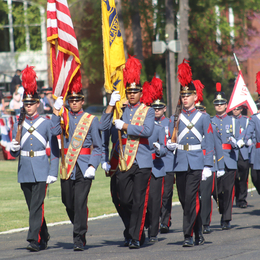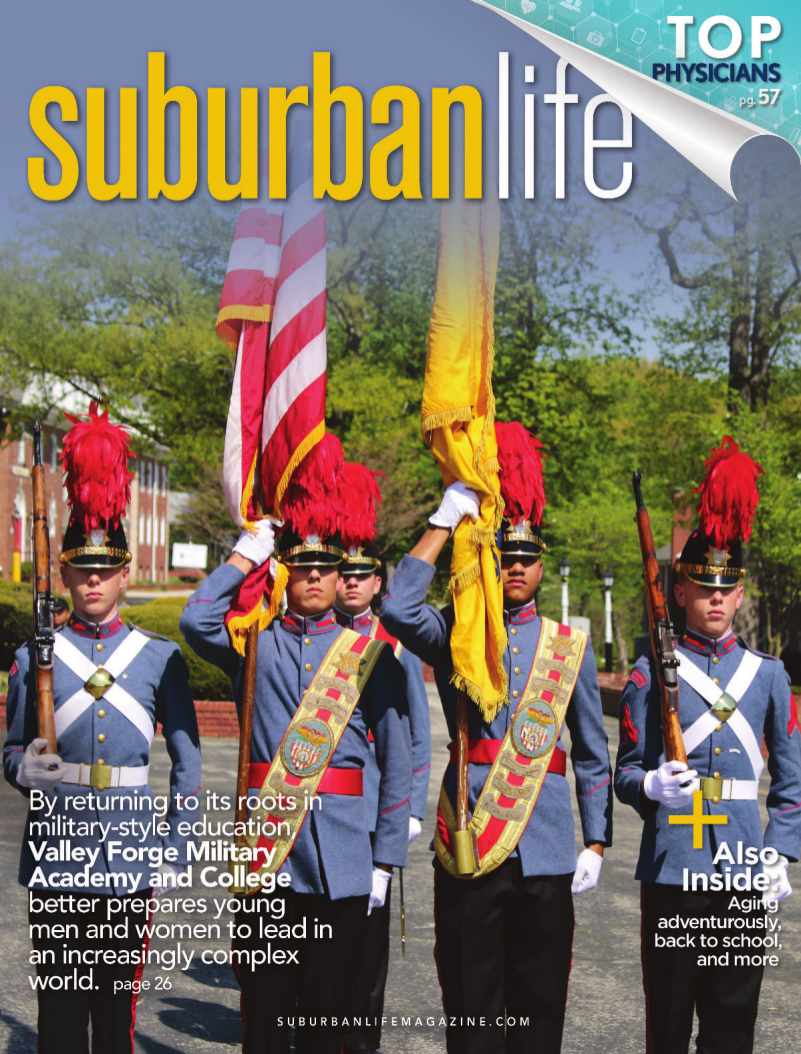
Forging Ahead
By returning to its roots in military-style education, Valley Forge Military Academy and College better prepares young men and women to lead in an increasingly complex world.
Col. Stuart B. Helgeson USMCR (Ret.) has never been one to back down from a challenge.
The desire to test his mettle not only fueled him in his collegiate athletic career at Penn State, where he played varsity football and lacrosse, but also compelled him to become a U.S. Marine. It also prepared him to become president of Valley Forge Military Academy and College (VFMAC) in March 2020, at the outset at one of the most disruptive and transformative periods in recent American history.
“I took over on March 2, and everything changed by March 14,” recalls Col. Helgeson, referring to the pandemic. “It was a shock to everyone, but it was also a great opportunity to learn and build a cohesive team. Adversity is how we learn.”
Since joining VFMAC in 2017, Col. Helgeson has served as chief operating officer, superintendent, and commandant of cadets, as well as co-president for a year with former CFO and COO Vincent J. Vuono. His time with VFMAC has shown him firsthand how a military-style education can change cadets’ lives for the better. Early into his tenure, however, he saw evidence of a storied institution struggling with its identity.
“I was passionate about turning this place around,” Col. Helgeson says. “I believed in its history and traditions, and I still believe a military-style education has a place. Not everyone who comes here goes into the military—in fact, only a small percentage do—but our students learn how to become strong, resilient citizen leaders who will build the future of this country.”
Since Col. Helgeson’s ascendance to his current post, VFMAC has “refocused the lens” to answer a vital question: Do the programs we offer help students get to where they need to be? Some tough decisions followed, and the resulting changes brought about a much-needed metamorphosis. While the institution did part ways with some programs, Col. Helgeson says the paring down has enabled VFMAC to grow in a more healthful way, “like a rose bush.”
Robert F. Smith, Ph.D., agrees. Dr. Smith came to VFMAC with a passion for history and education. As provost of Valley Forge Military College, where he also teaches military history, he believes the two-year college is better equipped to help men and women “boldly face the challenges life presents.”
“I’ve spent much of my career in a community college environment, and it has been rewarding to help students get started or remake themselves,” he adds. “You kind of get that here, but it’s a different experience. Our students are not just trying to mold themselves academically; they’re trying to change their habits and become better versions of themselves. They come here for an experience no one else has, and that means something.”
From the speakers they meet on campus to the experiences they have off campus, students learn how to live and lead in a complex, ever-changing world.
“Every two years we go to Valley Forge [National Historical] Park, and what gets them is when they go into the huts where the soldiers stayed,” he adds. “The experience helps them understand and respect the great determination it takes to be a soldier and an effective citizen leader. That’s something we take very seriously here, especially in the modern world.”
He cites one of the college’s most distinctive offerings, the Army ROTC Early Commissioning Program. VFMAC is the only college in the Northeast that enables a cadet to be commissioned as a second lieutenant by the end of their sophomore year. A graduate will then serve in a National Guard or Army Reserve unit as a platoon leader while completing a bachelor’s degree at a follow-up university or college. When a cadet receives a bachelor’s degree, they will continue to serve in the National Guard, in the Reserves, or as an active-duty officer around the world.
“An important part of our mission is to create early Army officers, but that’s not all we do,” Dr. Smith says. “Part of our restructuring over the past few years has been to use the same measuring stick to evaluate everything we do: Is this helping us further our mission based on our ‘Five Cornerstones’: academic excellence, leadership, character development, physical development, and personal motivation? By doing that, we can evaluate everything we do more clearly.”
The approach has helped him identify vital partnerships with transfer schools and other organizations, as well as the activities offered to cadets. It has also guided him in other decisions, such as bringing back key aspects of the athletics program, investing in facilities updates, and expanding degree programs to include more STEM (science, technology, engineering, and mathematics) components; the college is already a Center for Academic Excellence in cyber-defense for two-year colleges.
“We also want to move more programs online to prepare people for the workplace, and continue promoting the transferability of our degrees to bachelor’s programs,” Dr. Smith adds. “Our goal is to make the student experience more effective and enjoyable; just because you’re facing accountability doesn’t mean you shouldn’t enjoy what you’re doing.”
Lauren Wochok joined the VFMAC family 12 years ago. In 2022, she took over as head of school for Valley Forge Military Academy, a college preparatory military boarding school for boys in grades seven through 12. She believes the academy’s “family-like atmosphere,” academic rigor, and focus on character development combine to prepare young men for whatever comes next—college, the working world, or a path to the U.S. military.
“Each month we have a character trait we discuss throughout the whole institution—things like respect, teamwork, and integrity,” she says. “We weave those traits into the lessons and also bring in guest speakers around the theme. Personal motivation is a big one, which is so important no matter what they do in life, but especially for students as we prepare them for their first year of college.”
She believes the school’s intimate class sizes, one-to-one mentoring, and dual-enrollment program with Valley Forge Military College and other local universities enrich students’ chances of future success, and not just in the academic sense.
“We’re here to build leaders, through education and by helping them when they fall,” she adds. “Everyone makes mistakes, and we learn some of our most important lessons by our failures. Here, they learn how to overcome adversity, improve themselves, and develop their ability to lead others.”
From the academy to the college, VFMAC offers an experience that is increasingly hard to find, not only in Pennsylvania but also across the country. Yet the VFMAC brand is growing, as seen by the recent opening of Valley Forge Academy Qatar in Doha. Col. Helgeson calls the arrangement “a partnership,” with VFMAC offering governance overlap and sharing co-curricular programs with its sister location on the other side of the globe.
Much has changed since VFMAC’s founding in 1928. As the institution nears its centennial celebration, Col. Helgeson expects to announce even more positive developments on and off campus.
“We’re looking to do more to support outlying communities,” he says. “Our best marketing is getting our cadets out in public; that’s one of the reasons we took steps to bring back formations and parades, which we now do on Fridays so more people can watch. I think you’re going to see more of that.
“We are here to help young people lead,” he continues. “We want to build men and women of character—people who can be counted on, are self-sufficient, and have a team mindset. By learning to do those things, they will automatically become leaders, have influence, and make a difference in whatever organization they become part of going forward.”
Valley Forge Military Academy & College
1001 Eagle Road
Wayne, PA 19087
(610) 989-1200
www.vfmac.edu
1001 Eagle Road
Wayne, PA 19087
(610) 989-1200
www.vfmac.edu
Photo courtesy of VFMAC
Published (and copyrighted) in Suburban Life, August 2023.



